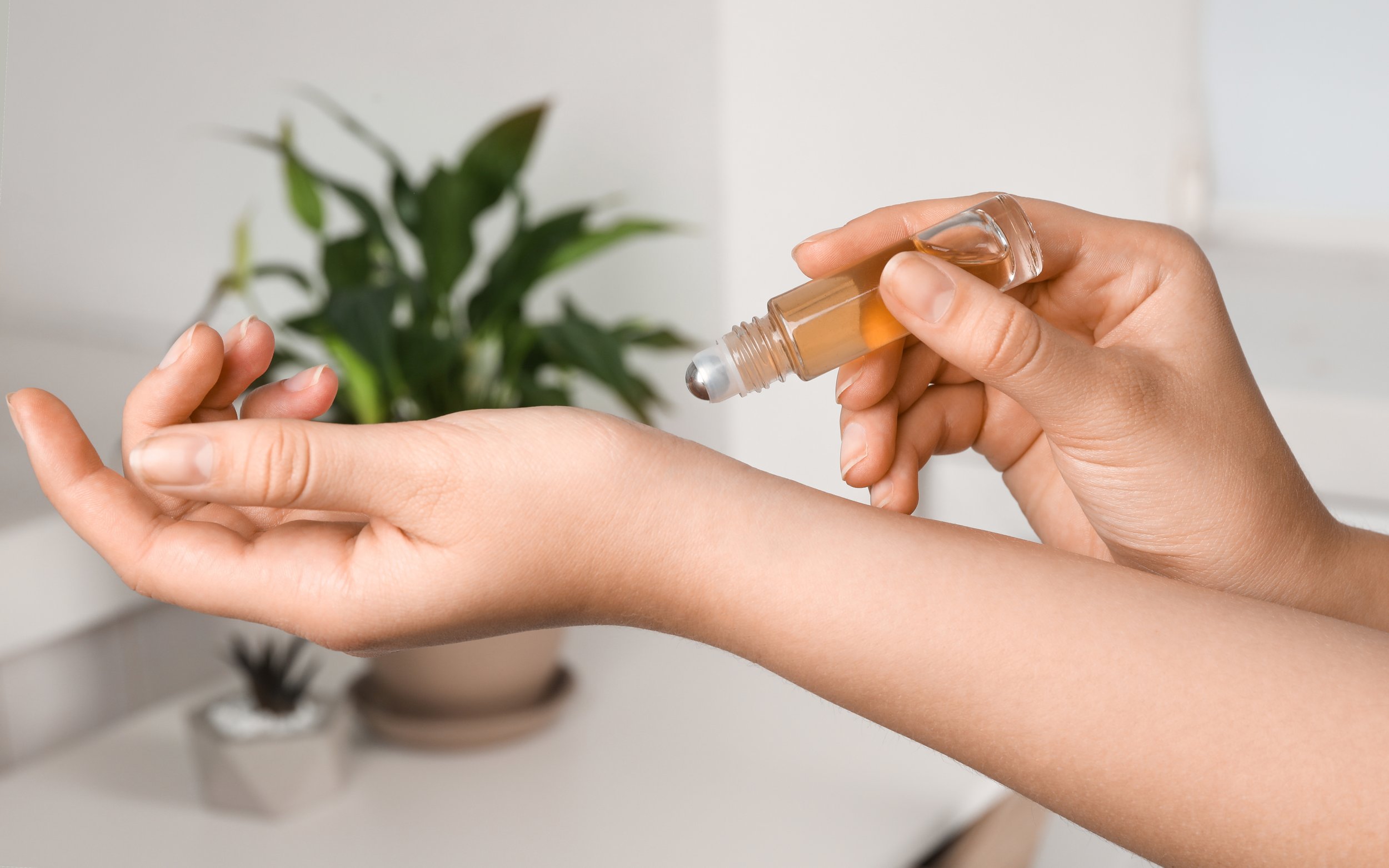Unmasking the Scent: What It Means If You Don't Like an Essential Oil
I remember the day I first smelled palo santo essential oil. I was beyond excited to embrace its gentle and soothing aroma that has been known to promote feelings of calmness, relaxation, and inner peace. I’m a huge fan of woody aromatics and couldn’t wait to breathe it in and unwind from my stressful day. I opened my bottle, took a smell and almost threw up. How in the world could anyone love this aroma??? Knowing something must have been off during distillation, I quickly shoved the bottle under my husband’s nose and demanded for him to smell it. His shoulders immediately relaxed, and he smiled. He loved it.
So, what was wrong with me? Why did I not like this scent, but my husband did. Does not liking a particular essential oil mean anything?
I started to dig into the science behind this topic more. There is this theory that if you don’t like the scent of an essential oil then your body actually needs it. For example, not liking an essential oil may signify a potential weakness in the organ/system that the essential oil has an affinity to. This theory is not true and currently there isn’t any research or science to prove this.
I have also heard the opposite. That if you don’t like the scent of an essential oil, your body is telling you that it isn’t good for you. While I think there is a touch more credibility to this as our bodies will generally show adverse reactions such as headaches and skin irritations to certain chemicals in our environment; I don’t think it extends to all circumstances with essential oils. For example, I have endometriosis and do not love the aroma of fennel essential oil. What we know about fennel essential oil is that it is extremely high in the chemical constituent trans-anethole. Trans-anethole has been studied to impact estrogen levels, therefore, it should be avoided in women diagnosed with estrogen dominant diseases such as endometriosis. Do I think my nose is knowingly telling me to avoid fennel? I wish it was that simple, but it is likely purely coincidental.
What does it mean if you don’t like the scent of an essential oil?
Aromatherapy, the practice of using essential oils to enhance well-being, is celebrated for its ability to stimulate our senses and evoke emotions through scent. However, not all essential oils are created equal, and personal preferences can vary widely. If you find yourself disliking the scent of a particular essential oil, you might wonder what this means. Does it have any significance? Let’s explore the reasons behind our reactions to scents and what it might imply if you don't resonate with a particular essential oil.
The Power of Personal Preference:
Before diving into the reasons behind your aversion to an essential oil's scent, it's important to acknowledge the influence of personal preference. Our olfactory senses are highly individualistic, and what one person finds delightful, another may find off-putting. Your unique life experiences, memories, and sensitivities all play a role in shaping your scent preferences.
1. Past Associations:
Our olfactory system is closely linked to memory and emotion. A dislike for a particular scent could be due to past experiences associated with it. For example, if you had a negative experience while surrounded by a particular aroma, your brain may register it as unpleasant or triggering.
“Smell is a potent wizard that transports you across thousands of miles and all the years you have lived. The odors of fruits waft me to my southern home, to my childhood frolics in the peach orchard. Other odors, instantaneous and fleeting, cause my heart to dilate joyously or contract with remembered grief.”
-Helen Keller
The olfactory system is a complex network that allows us to detect and identify different scents. When we inhale a scent, sensory receptors in our nose capture the molecules that make up the scent. These receptors send signals to the olfactory bulb, located at the base of the brain, where the scent is processed and analyzed. From the olfactory bulb, the scent information is then relayed to the limbic system, specifically the amygdala and hippocampus. The amygdala is responsible for processing emotions, while the hippocampus plays a key role in memory formation. This direct connection between scent and the limbic system is the reason why scents have such a profound impact on our emotions and memories.
When we encounter a scent that is familiar, the information about that scent is matched against our stored memories. If the scent matches a memory, the limbic system is activated, and a cascade of emotions and memories is triggered.
A great example of this is how some people think cedarwood smells like cat urine. Yes, cat urine! Due to the limbic system’s incredible ability to store memories by linking them with scents, this can result in positive and negative associations. If you also think cedarwood smells like cat urine this is likely due to the fact that you had or knew someone who previously had a cat. Cedarwood was formerly used in kitty litter as it is highly absorbent; not to mention the strong aroma was also used to mask the smell of cat urine. So, you developed a memory scent association and now every time you smell cedarwood, it reminds you of cat urine. Keep reading for ways to undo this association.
2. Sensory Sensitivities:
Some individuals have heightened sensitivity to certain scents or specific chemical compounds found in essential oils. If you have sensory sensitivities or allergies, your body may react negatively to certain fragrances, leading to aversions. There are a great deal of factors that influence our olfactory preferences. Memory connections and exposure can change with time. But also, age, common colds and flu, allergies, medications, radiation, hormones, pregnancy and overstimulation can all play a role.
3. Emotional States:
Your emotional state at a given moment can influence your response to scents. When you're feeling stressed, anxious or exhausted, you might be more sensitive to strong or overpowering scents, finding them less appealing. If you are a woman, fluctuations in estrogen and progesterone can impact how well you smell as well as what aromas you prefer. For example, during week 1 of the monthly cycle estrogen is at it’s lowest point therefore our sense of smell is lagging. (1) During week 2 of the monthly cycle, the higher estrogen allows our sense of smell to detect more subtle aromas. (2) During week 4, we tend to feel overpowered and even annoyed by certain aromas. (3)
4. Personal Taste and Smell Preferences:
Simply put, everyone has their own likes and dislikes when it comes to aromas. It's perfectly normal not to enjoy the scent of every essential oil. Your personal preferences may align more with floral, earthy, citrusy, or spicy aromas, and that's absolutely fine. Certain essential oils are emphasized for emotional and stress support based on their unique constituents and what they have been studied for, however, any aroma that is considered pleasant can be helpful in initiating a relaxation response.
5. Lack Familiarity:
You may lack familiarity with the essential oil. If it is your first time being exposed to it, you may find it unpleasant at first as you have no past associations or experience with it. Once you build that relationship with the essential oil, this can change.
6. Chemical Composition:
The complex chemical composition of essential oils can also influence your perception. Some oils contain compounds that are more polarizing, and your sensitivity to these compounds (or associations with similar constituents) may affect your reaction to the oil's scent.
7. Overexposure:
Sometimes, overexposure to a particular scent can lead to sensory fatigue, making the aroma less appealing over time. If you've been using a specific essential oil frequently, it may be helpful to take a break and return to it later.
What to Do If You Don't Like an Essential Oil:
If you encounter an essential oil that doesn't resonate with you, don't worry. It's a common experience, and there are several steps you can take:
1. Experiment: Try diluting the essential oil with a carrier oil or blending it with other oils to create a more pleasing scent profile. If you have a negative memory scent association with an essential oil (ex: cedarwood and cat urine), this association can be undone with time and practice. To undo this association, slowly reintroduce cedarwood with other essential oils. For example, if you are diffusing lavender and cedarwood, diffuse 5 drops of lavender and 1 drop of cedarwood. Every few weeks, gradually increase the cedarwood and decrease the lavender essential oil. Eventually, your memory will start to make a new association with the aroma.
2. Give it time: What’s interesting is that our olfactory receptor cells are being regenerated every 30 days to replace neurons damaged by exposure to our environment. (4) This may influence our olfactory perceptions and preferences. So, as you continue to grow your olfactory palate with time, your preferences can change.
3. Explore Alternatives: There are hundreds of essential oils to choose from. If you don't like one, explore different options until you find scents that align with your preferences.
4. Understand the Benefits: Even if you don't enjoy the aroma, you can still benefit from an essential oil's therapeutic properties by using it in a diffuser or in topical applications (diluted) for specific concerns.
5. Consult an Aromatherapist: A certified aromatherapist can help you select essential oils that align with your preferences and address your specific needs.
The world of essential oils is vast and diverse, and it's perfectly normal not to like the scent of every oil you encounter. Your olfactory preferences are deeply personal and can be influenced by a variety of factors. Instead of feeling discouraged by a dislike for a particular essential oil, use it as an opportunity to explore and discover scents that truly resonate with you. Remember that the world of aromatherapy offers an array of options to cater to your unique preferences and well-being needs.
Want to learn more about using essential oils? Check out my latest book Science of Essentials: The Essential Guide for Using Aromatherapy to Promote Health and Healing here.
Looking for more education on using essential oils for emotional health? See my blog article, The Best Essential Oils for Stress and Anxiety and 5 Tips for Using Aromatherapy for Stress Relief.
Disclaimer: This blog is for general informational purposes only and does not constitute the practice of medicine, nursing or other professional health care services, including the giving of medical advice. The use of information on this blog or materials linked from this blog is at the user's own risk. The content of this blog is not intended to be a substitute for professional medical advice, diagnosis, or treatment. Users should not disregard, or delay in obtaining, medical advice for any medical condition they may have, and should seek the assistance of their health care professionals for any such conditions.
References:
Graham CA, Janssen E, Sanders SA. Effects of fragrance on female sexual arousal and mood across the menstrual cycle. Psychophysiology. 2000 Jan;37(1):76-84.
Navarrete-Palacios E, Hudson R, Reyes-Guerrero G, Guevara-Guzmán R. Lower olfactory threshold during the ovulatory phase of the menstrual cycle. Biol Psychol. 2003 Jul;63(3):269-79. doi: 10.1016/s0301-0511(03)00076-0.
Bogdan MS, Slavic DO, Babovic SS, Zvezdin BS, Kolarov VP, Kljajic VL. Olfactory Perception and Different Decongestive Response of the Nasal Mucosa During Menstrual Cycle. Am J Rhinol Allergy. 2021 Sep;35(5):693-699. doi: 10.1177/1945892421990308. Epub 2021 Jan 26.
Smith TD, Bhatnagar KP. Anatomy of the olfactory system. Handb Clin Neurol. 2019;164:17-28. doi: 10.1016/B978-0-444-63855-7.00002-2.


